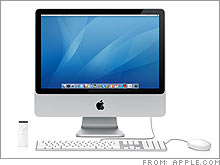Apple's surprise weapon: ComputersThe iPod and iPhone are hits, but they're not the company's hottest line, says Fortune's Brent Schlender.(Fortune Magazine) -- Last January, when Steve Jobs rechristened his company by ostentatiously excising the word "Computer" and leaving it as simply "Apple Inc.," he did so during the very same public event when he first showed off the iPhone. It also came right about the time that combined sales of iPod music players and iTunes music downloads eclipsed revenues from Apple's mainstay Macintosh personal computers.
The new name seemed to concede the obvious: The company's PC business, which for well over a decade couldn't garner even 5 percent of the U.S. market (nor more than 3 percent worldwide), would no longer be front and center. After all, the stripling iPod and iTunes Music Store were holding almost Microsoftian sway in their realms, and the iPhone already was the most ballyhooed new gadget since the transistor radio. But a funny thing has happened over the past couple of quarters. While Apple has been firing on all cylinders, and the iPhone is selling hundreds of thousands of units a month, its Macintosh business is the hottest line of all. It roared back in the quarter that ended in June to reclaim its status as the company's largest revenue source and, at long last, break that 5 percent share barrier, according to IDC. Indeed, Apple's U.S. Mac sales have grown at triple the rate of the rest of the PC industry since last fall, propelling it into third place in the U.S., behind Dell (Charts, Fortune 500) and Hewlett-Packard (Charts, Fortune 500). "Whoop-de-doo," you might say. "A market share in the mid single digits isn't even table scraps compared to the combined force of all those Windows PC makers." But if you parse the market, you realize that Apple's seemingly min-uscule share is much, much greater in the slices it has targeted. For one thing, Apple's PCs are truly personal. Apple (Charts, Fortune 500) has always pitched them primarily as consumer products, and they're designed with the creative individual - not the corporate IT department - in mind. Apple doesn't even pretend to compete for the corporate servers that are technically considered PCs because of their internal design; those account for about a fifth of the market. Nor has it ever targeted big business, other than publishers and creative departments. The bulk of Macs are purchased by consumers and students who make their own buying decisions rather than take what an employer issues. Apple has a 15 percent market share of PCs sold at retail and online, according to NPD. Having its own flashy stores helps, of course, as does its clever advertising. But more important, you also can see why even modest gains translate into outsized growth in Cupertino. The overall U.S. PC market is so large - 65.5 million were sold in 2006 - that picking up a percentage point of share for Apple, which last year sold about 3.1 million Macs, means its unit sales would jump 20 to 25 percent. And the Mac business is already quite profitable, so the incremental sales yield even better margins. A tiny nick to Dell and HP is gravy for Jobs. In other words, there's a lot of room for Apple to expand without gouging Microsoft and Windows PC makers, which will also probably keep growing, albeit at a slower pace from a larger base. Finally, Apple's software could turn the Mac into a phenomenon again, perhaps even in corporations. Apple is arguably the best software company on the planet, regularly releasing basic operating system software and application programs that reveal the greater potential of computers as devices for communication, creativity and entertainment. Most of Apple's software gets an overhaul every few years and is constantly freshened with free, easy, online upgrades that improve performance. Also, now that Macs sport Intel processors, the machines are just as powerful as their rivals and, with a little tweaking, can run standard Windows software, including custom applications that many people have to use to do their jobs. Macs could make inroads into more businesses as employees who use them at home begin to demand them of their IT departments. So what's the lesson? Apple is growing faster than its competitors because it improves its hardware and software more often than anyone else. It is broadening what we think of as a consumer-oriented PC and thus helping its market grow. That's a good long-term investment story. And, oh, by the way, Apple also makes some pretty slick music players and cell phones. |
Sponsors
|

